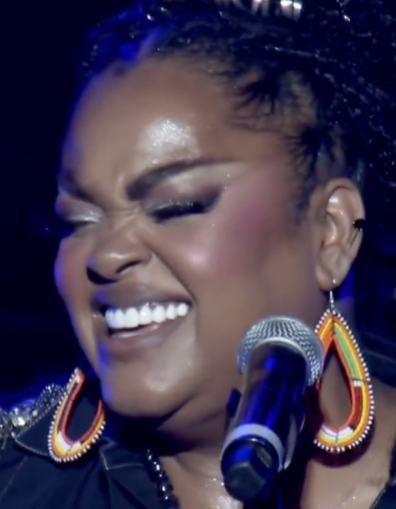Taking on the national anthem, Jill Scott sings truth about U.S. racism
“Oh, say, can you see, by the blood in the streets, that this place doesn’t smile on you, colored child. Whose blood built this place with sweat and their hands. But you’ll die in this place and your memory erased. Oh say, does this truth hold any weight? This is not the land of the free but the home of the slave.”

Jill Scott sings national anthem, July 2, 2023.
These lyrics were sung to the melody of the “Star-Spangled Banner” (the U.S. national anthem) by the brilliant African American singer, Jill Scott, at the Essence Festival July 2 in New Orleans. The annual music festival, which takes place over the Fourth of July weekend, is one of the largest African American music events in the U.S. This year’s Festival attracted 500,000 people.
Scott’s anti-racist, anti-patriotic, powerful rendition is reminiscent of the year-long public protest that Colin Kaepernick, the former National Football League quarterback, conducted throughout the 2016 football season by taking a knee during the playing of the anthem to protest racial injustice.
The police murders of Philando Castile in the Minneapolis-Saint Paul area and Alton Sterling in Baton Rouge, Louisiana, during the summer of 2016 happened just months before Kaepernick sparked this historic protest movement amongst athletes from all sports, professional and amateur.
During this same period of protests, Francis Scott Key, who wrote the text of the anthem in 1814, was exposed for being a slaveowner and for writing pro-slavery lyrics for the third verse of the anthem.
Jill Scott’s rendition drew the ire of rightwing news pundits, with media like Fox News and the New York Post – along with rightwing politicians – accusing her of “shaming” and “trashing” the national anthem with her “alleged” racial injustice lyrics. They accused her of being hypocritical because of her financial success as an entertainer.
But many praised her rendition for telling the truth about the legacy of slavery that is alive and well throughout every aspect of today’s society.
If she did not sing this version of the anthem at such a huge public event, it might have gone unnoticed, but she stated that she sang the anthem at previous lesser known events, having written these lyrics over 30 years ago in her hometown of Philadelphia before she burst onto the music scene.
Jill Scott’s bold action must be defended because her lyrics express the class truth of the second-class, institutionalized status that still exists for Black people in the U.S. that can never be denied or silenced.
Go to youtube.com/watch?v=B1tyFi-BTW0 to see Scott’s performance.

